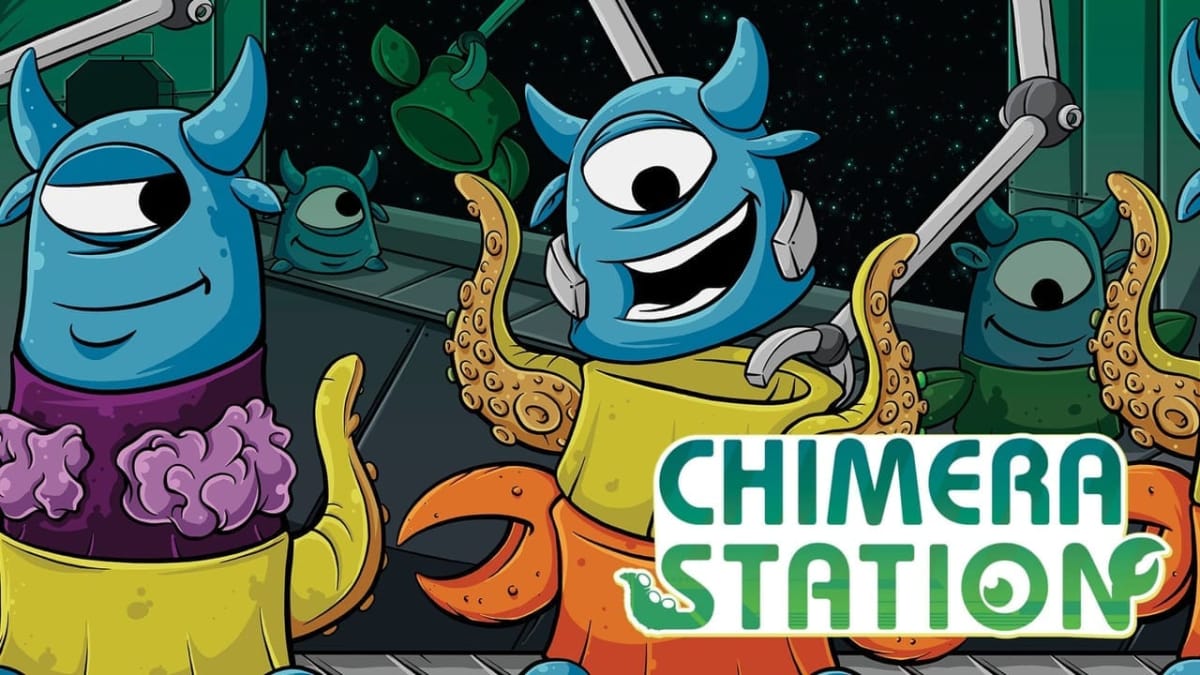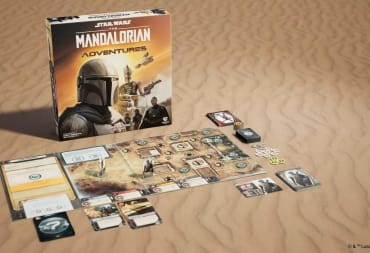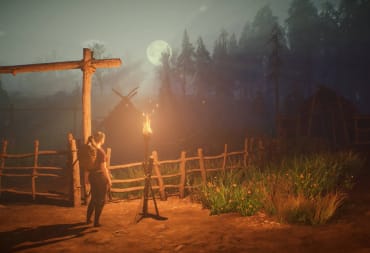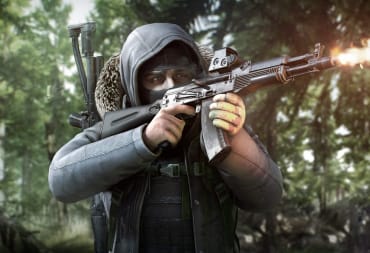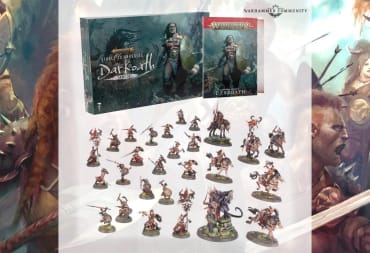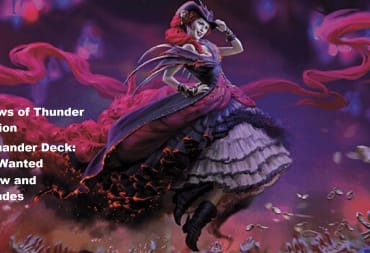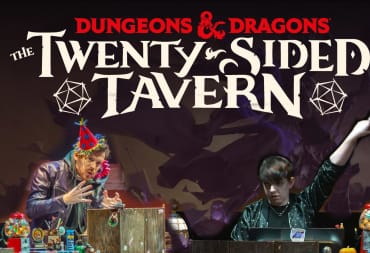Many of us have worked at a company where everybody is good at that one thing. Bob is really fast at his job, Jim is always on time, and Mary is always friendly with the customers. If you could take the best bits from all three you'd have a perfect employee! Of course, it'd be silly to try and splice your coworkers together into a horrifying, Lovecraftian chimera just to get a few more orders shipped. Why not take a look at Chimera Station (by Tasty Minstrel Games) and simulate low-level genetic engineering instead?
Chimera Station pits 2–4 players against one another as they try to earn as much money as possible in the titular station. Each player gets a fixed amount of tops and bottoms for their worker figurines to comprise their workforce. They get a card that defines their starting resources and markers to track their score and their research progress.
Each round of the game is split into phases. In the Placement Phase, players will put one of their workers on a Module on the map to gain benefits from the module, a player's Perk Card to gain those specific perks, the Splicing Lab in order to change the worker's abilities, or the Worker Lounge in order to gain more food. In the Splicing Phase, players will deploy their workers from the Splicing Lab to make use of their new enhancements. The Feeding Phase requires that you pull all of your workers off the board and feed them; if you're short on food, you'll lose genetic enhancements, and failing that you'll lose points! The entire game is played over five rounds comprised of these phases for a game lasting a total of 60-90 minutes.
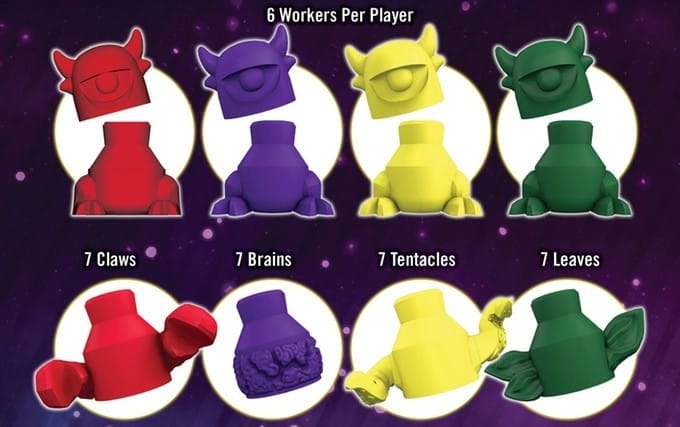
There are four different choices for genetic splicing. The Brains component allows a worker to score points equivalent to the point value of the Module it's positioned on. Placing two Brains components on the same worker will give you an additional bonus of scoring points equal to the point value of the modules all of your workers are placed on. Modules can typically only be occupied by one worker and claws are the solution to that problem. Claws allow a worker to displace any non-modified opponent's worker, and double claws will allow a worker to displace any of your opponent's workers. Leaves will keep a worker fed for free, and double Leaves will also generate two food for the other workers. Lastly, tentacles allow a worker to collect an additional resource depending on the module they're on and double tentacles will allow them to pick up an extra component whenever a worker acquires one. Workers can have a maximum of two attached components (regardless of type).
Throughout the course of the game, players will build modules to score points and increase opportunities for collecting resources. Modules are placed on the reactor track at the start of the game. Modules require power, and eventually you'll have to refill the station's reactor to be able to build more. Refilling the reactor will result in bonuses for the player completing that action depending on how much it's been drained, and players can discard their starting resource card once per game in order to completely flush the reactor to clear it out and refill it.
At the end of the game, players will be scored based on the resources and points they've accumulated. 3 coins are worth 1 point, 2 food is worth 1 point, and each component (whether attached or unattached) is worth 2 points. Players may also gain additional points dependent on their perk cards. These bonuses are combined with the points scored during the game, and the player with the highest amount of points wins!
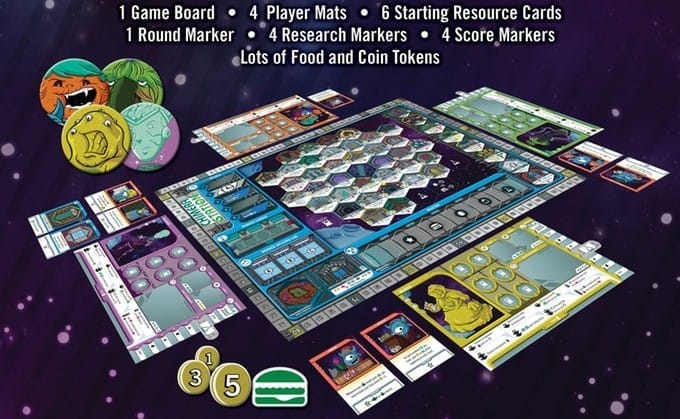
Tasty Minstrel Games' Kickstarter campaign is relatively straightforward. The $1 pledge level is explicitly reserved for interested retailers looking to establish a point of contact. A $45 pledge will get you a retail version of the game shipped anywhere in the world. $60 will get you a Deluxe copy of the game with metal coins, as well as all Deluxe Stretch Goals and upgrades. For $61, you can get a Deluxe copy of the game in either Brazilian Portuguese (shipped to Brazil only), Chinese (shipped to certain countries only), and German (shipped to EU countries only). And that's it! You can elect to either buy the game or buy a deluxe version of the game with multiple choices for language.
There are only three Stretch Goals for the campaign. At $70,000, the Retail and Deluxe editions will get double-sided player mats. At $80,000, the Deluxe Edition of the game will get silk-screened wooden food tokens. At $100,000, the Deluxe edition of the game will get the "Maintenance Crew" mini-expansion added into the box. The Deluxe edition of the game will not be available for retail purchase.
Tasty Minstrel Games' campaign for Chimera Station is at a bit over $70,000 of the $60,000 goal, meaning it's already surpassed their first stretch goal. Tasty Minstrel Games has had 28 Kickstarter campaigns so far. Only three of those were canceled (one of which was canceled and re-launched right away, likely due to an error in the campaign) and only one has failed to meet its funding goal. They have a good deal of experience on making games and fulfilling Kickstarter campaigns. If Chimera Station sounds like the sort of game you'd be interested in playing, you can check out Tasty Minstrel Games' Kickstarter campaign here. The campaign ends on October 8, 2016 at 12:00AM EDT.
What do you think of Chimera Station by Tasty Minstrel Games? Does the idea of genetically engineering your mutated workers to fuel your business appeal to you? What do you think of how Tasty Minstrel Games has set up the pledges? Let us know in the comments below!
Have a tip, or want to point out something we missed? Leave a Comment or e-mail us at tips@techraptor.net
